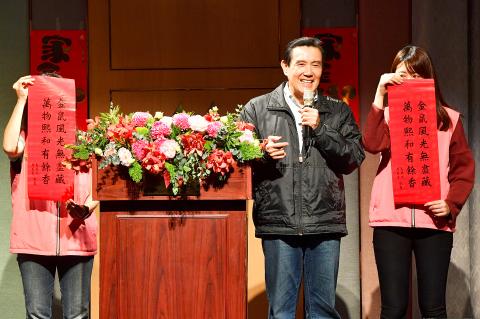China has to take responsibility for skewing the so-called “1992 consensus,” former president Ma Ying-jeou (馬英九) said yesterday, adding that Beijing omitted “different interpretations” and only focused on “one China.”
Ma made the remarks when asked about discussion within the Chinese Nationalist Party (KMT) following its losses in the Jan. 11 presidential and legislative elections about whether the party should improve or abandon the “1992 consensus.”
The “1992 consensus” — a term that former Mainland Affairs Council chairman Su Chi (蘇起) in 2006 admitted making up in 2000 — refers to a tacit understanding between the KMT and the Chinese Communist Party that both sides of the Taiwan Strait acknowledge that there is “one China,” with each side having its own interpretation of what “China” means.

Photo: CNA
“Both Taiwan and the Mainland have agreed to the consensus — otherwise, there would be no consensus. I think everyone misunderstands the consensus. It is, of necessity, a Taiwanese consensus and also one across the Taiwan Strait — only then would it have any effect,” Ma said yesterday.
The “consensus” benefits Taiwan by offering it flexibility and echoing the “one China” principle as stated by the Republic of China (ROC) Constitution — both of which enable cross-strait interaction, Ma added.
“I think the Mainland has to take certain responsibility for the misunderstanding, as it has placed too much emphasis on ‘one China’ and forgets there is the component ‘each side having its own interpretation,’” Ma said, adding that not clearing up the matter would make cross-strait relations increasingly difficult.
In a related development, KMT Youth League head Hsiao Ching-yan (蕭敬嚴) on Friday proposed that the party should move away from pro-unification discourse.
Taiwanese have “achieved consensus in refusing to acknowledge the legitimacy of the 1992 consensus,” Hsiao said in an interview with the China Review News Agency, adding that the party should find a new consensus, one that is anti-unification.
While acknowledging that his view was similar to the Democratic Progressive Party’s (DPP), Hsiao said that, based on his observations, any variation of the “1992 consensus” — as long as it contained the same “one China with separate interpretations” spirit — would likely be rejected by Taiwanese.
Hsiao added that his observations showed that Taiwanese agree with three concepts: “the ROC is in Taiwan,” “independent sovereignty should not be violated” and “unification should be adamantly opposed.”
Given this, Hsiao urged the party to base its cross-strait discourse on these three concepts.
However, KMT Central Advisory Committee member Chang Ya-ping (張雅屏) slammed Hsiao’s suggestion.
The KMT is “the defender of the ROC” and the Constitution is the “Constitution of the ROC,” which supports the “one China” ideology, Chang said.
The KMT must defend the Constitution and becoming anti-unification is to “deny the legitimacy of the ROC Constitution,” he said, adding that any person who refuses to defend the Constitution should resign from the KMT.
An Internet user said that it was perplexing that such a good idea from Hsiao — one that could win the party votes from the younger generation — should be met with such hostility by the party’s leadership.
Pro-unification supporters in the KMT should leave Taiwan, another netizen said.

A preclearance service to facilitate entry for people traveling to select airports in Japan would be available from Thursday next week to Feb. 25 at Taiwan Taoyuan International Airport, Taoyuan International Airport Corp (TIAC) said on Tuesday. The service was first made available to Taiwanese travelers throughout the winter vacation of 2024 and during the Lunar New Year holiday. In addition to flights to the Japanese cities of Hakodate, Asahikawa, Akita, Sendai, Niigata, Okayama, Takamatsu, Kumamoto and Kagoshima, the service would be available to travelers to Kobe and Oita. The service can be accessed by passengers of 15 flight routes operated by

MORE FALL: An investigation into one of Xi’s key cronies, part of a broader ‘anti-corruption’ drive, indicates that he might have a deep distrust in the military, an expert said China’s latest military purge underscores systemic risks in its shift from collective leadership to sole rule under Chinese President Xi Jinping (習近平), and could disrupt its chain of command and military capabilities, a national security official said yesterday. If decisionmaking within the Chinese Communist Party has become “irrational” under one-man rule, the Taiwan Strait and the regional situation must be approached with extreme caution, given unforeseen risks, they added. The anonymous official made the remarks as China’s Central Military Commission Vice Chairman Zhang Youxia (張又俠) and Joint Staff Department Chief of Staff Liu Zhenli (劉振立) were reportedly being investigated for suspected “serious

ENHANCING EFFICIENCY: The apron can accommodate 16 airplanes overnight at Taoyuan airport while work on the third runway continues, the transport minister said A new temporary overnight parking apron at Taiwan Taoyuan International Airport is to start operating on Friday next week to boost operational efficiency while the third runway is being constructed, the Ministry of Transportation and Communications said yesterday. The apron — one of the crucial projects in the construction of the third runway — can accommodate 16 aircraft overnight at the nation’s largest international airport, Minister of Transportation and Communications Chen Shih-kai (陳世凱) told reporters while inspecting the new facility yesterday morning. Aside from providing the airport operator with greater flexibility in aircraft parking during the third runway construction,

American climber Alex Honnold is to attempt a free climb of Taipei 101 today at 9am, with traffic closures around the skyscraper. To accommodate the climb attempt and filming, the Taipei Department of Transportation said traffic controls would be enforced around the Taipei 101 area. If weather conditions delay the climb, the restrictions would be pushed back to tomorrow. Traffic controls would be in place today from 7am to 11am around the Taipei 101 area, the department said. Songzhi Road would be fully closed in both directions between Songlian Road and Xinyi Road Sec 5, it said, adding that bidirectional traffic controls would